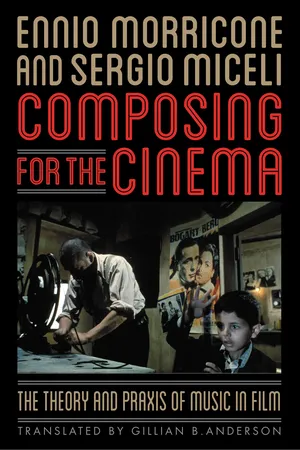
eBook - ePub
Composing for the Cinema
The Theory and Praxis of Music in Film
- English
- ePUB (mobile friendly)
- Available on iOS & Android
eBook - ePub
Composing for the Cinema
The Theory and Praxis of Music in Film
About this book
With nearly 400 scores to his credit, Ennio Morricone is one of the most prolific and influential film composers working today. He has collaborated with many significant directors, and his scores for such films as The Good, the Bad, and the Ugly; Once Upon a Time in America; Days of Heaven; The Mission; The Untouchables; Malèna; and Cinema Paradiso leave moviegoers with the conviction that something special was achieved—a conviction shared by composers, scholars, and fans alike.
In Composing for the Cinema: The Theory and Praxis of Music in Film, Morricone and musicologist Sergio Miceli present a series of lectures on the composition and analysis of film music. Adapted from several lectures and seminars, these lessons show how sound design can be analyzed and offer a variety of musical solutions to many different kinds of film. Though aimed at composers, Morricone's expositions are easy to understand and fascinating even to those without any musical training. Drawing upon scores by himself and others, the composer also provides insight into his relationships with many of the directors with whom he has collaborated, including Sergio Leone, Giuseppe Tornatore, Franco Zeffirelli, Warren Beatty, Ridley Scott, Roland Joffé, the Taviani Brothers, and others.
Translated and edited by Gillian B. Anderson, an orchestral conductor and musicologist, these lessons reveal Morricone's passion about musical expression. Delivered in a conversational mode that is both comprehensible and interesting, this groundbreaking work intertwines analysis with practical details of film music composition. Aimed at a wide audience of composers, musicians, film historians, and fans, Composing for the Cinema contains a treasure trove of practical information and observations from a distinguished musicologist and one of the most accomplished composers on the international film scene.
In Composing for the Cinema: The Theory and Praxis of Music in Film, Morricone and musicologist Sergio Miceli present a series of lectures on the composition and analysis of film music. Adapted from several lectures and seminars, these lessons show how sound design can be analyzed and offer a variety of musical solutions to many different kinds of film. Though aimed at composers, Morricone's expositions are easy to understand and fascinating even to those without any musical training. Drawing upon scores by himself and others, the composer also provides insight into his relationships with many of the directors with whom he has collaborated, including Sergio Leone, Giuseppe Tornatore, Franco Zeffirelli, Warren Beatty, Ridley Scott, Roland Joffé, the Taviani Brothers, and others.
Translated and edited by Gillian B. Anderson, an orchestral conductor and musicologist, these lessons reveal Morricone's passion about musical expression. Delivered in a conversational mode that is both comprehensible and interesting, this groundbreaking work intertwines analysis with practical details of film music composition. Aimed at a wide audience of composers, musicians, film historians, and fans, Composing for the Cinema contains a treasure trove of practical information and observations from a distinguished musicologist and one of the most accomplished composers on the international film scene.
Frequently asked questions
Yes, you can cancel anytime from the Subscription tab in your account settings on the Perlego website. Your subscription will stay active until the end of your current billing period. Learn how to cancel your subscription.
No, books cannot be downloaded as external files, such as PDFs, for use outside of Perlego. However, you can download books within the Perlego app for offline reading on mobile or tablet. Learn more here.
Perlego offers two plans: Essential and Complete
- Essential is ideal for learners and professionals who enjoy exploring a wide range of subjects. Access the Essential Library with 800,000+ trusted titles and best-sellers across business, personal growth, and the humanities. Includes unlimited reading time and Standard Read Aloud voice.
- Complete: Perfect for advanced learners and researchers needing full, unrestricted access. Unlock 1.4M+ books across hundreds of subjects, including academic and specialized titles. The Complete Plan also includes advanced features like Premium Read Aloud and Research Assistant.
We are an online textbook subscription service, where you can get access to an entire online library for less than the price of a single book per month. With over 1 million books across 1000+ topics, we’ve got you covered! Learn more here.
Look out for the read-aloud symbol on your next book to see if you can listen to it. The read-aloud tool reads text aloud for you, highlighting the text as it is being read. You can pause it, speed it up and slow it down. Learn more here.
Yes! You can use the Perlego app on both iOS or Android devices to read anytime, anywhere — even offline. Perfect for commutes or when you’re on the go.
Please note we cannot support devices running on iOS 13 and Android 7 or earlier. Learn more about using the app.
Please note we cannot support devices running on iOS 13 and Android 7 or earlier. Learn more about using the app.
Yes, you can access Composing for the Cinema by Ennio Morricone,Sergio Miceli, Gillian B. Anderson in PDF and/or ePUB format, as well as other popular books in Media & Performing Arts & Film & Video. We have over one million books available in our catalogue for you to explore.
Information
Table of contents
- Title Page
- Translator’s Note
- Editor’s Note
- Acknowledgments
- Abbreviations
- Introduction
- Audiovisual Analysis—Part 1
- Production Procedures
- Audiovisual Analysis—Part 2
- Premix and Final Mix
- Compositional Elements
- Questions and Answers
- Composing for the Cinema
- Writing for the Cinema
- Filmography
- Bibliography [to 1999]
- Index
- About the Authors and Translator